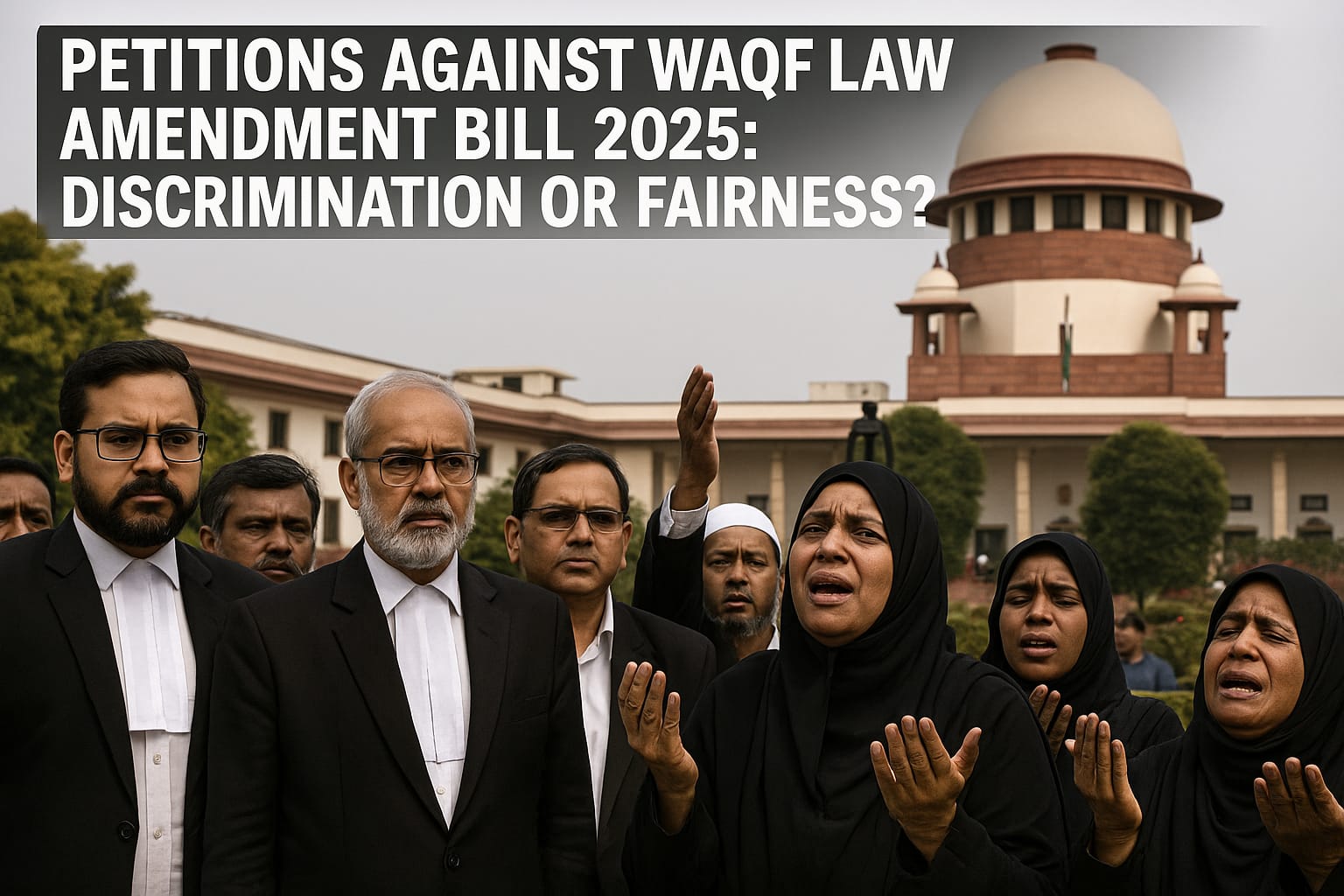INTRODUCTION
Petitioners are contesting the constitutionality of the recently enacted Waqf (Amendment) Act, 2025, before the Supreme Court.
This article will study the provisions of the recent amendment and its impact. It will also study the presence of fair grounds. It will explore the history of the current petitions and will predict the judgement to some extent.
BRIEF HISTORY
In order to regulate Waqf properties—that is, religious endowments or properties solely used for religious or charitable purposes under Islamic law—the new law modified the Waqf Act, 1995.
Numerous applications were submitted contesting the constitutionality of the change, but the Court has stated that it will only consider five of the petitioners.
The petitioners have argued that the modification amounted to unjustified involvement in Islamic religious issues and the administration of waqf properties, as well as discrimination against Muslims.
The change has been defended by the Union government, which claims that it was introduced to stop the abuse of waqf provisions, which were being used to infringe on both government and private property. The petitioners have contended in rejoinders that if the Amendment Act is upheld in its entirety, the Muslim community’s rights would be violated.
In the meantime, the central government was joined in defending the amendment by six states that were headed by the Bharatiya Janta Party. Remarkably, the Sree Narayana Manava Dharmam Trust, a Hindu organization with headquarters in Kerala, has also filed a petition against the modification, claiming that it jeopardizes the Muslim community’s continued existence in India. In opposition to the changes, the State of Kerala has also petitioned the Court.
On the grounds that the concerns raised by the Muslim community are legitimate, the State of Kerala has filed an intervention application against the modification more recently.
CURRENT STATUS OF THE ACT
The Central government promised the Bench, which was then presided over by Chief Justice of India (CJI) Sanjiv Khanna, on April 17 that it would temporarily refrain from enforcing a number of important Act provisions. The Court opted not to issue an express stay after noting this guarantee. The case is currently before the e-Bend, which is made up of Justice AG Masih and CJI BR Gavai, following CJI Khanna’s retirement on May 13.
THE AMENDMENT ACT
The Waqf (Amendment Act), 2025 According to Muslim law, Waqf properties are properties set aside for religious, charitable, or educational purposes. The Waqf (Amendment) Bill, 2025, seeks to modernize and simplify the administration of these properties. Improved conflict resolution, greater accountability and openness, and the involvement of women and non-Muslims in Waqf governance are important features.
MAIN FEATURES
The Waqf (Amendment) Bill, 2025’s main points are:
Increased Accountability and Transparency:
A central site for registering property details is one of the measures the bill proposes for improved supervision and documentation of Waqf properties.
Simplified Administration:
According to the PIB, the measure intends to use modernized procedures and technology to manage Waqf properties more effectively and with less bureaucratic hold-ups.
Protection of Waqf Properties: By imposing harsher penalties for infractions, the measure increases the Waqf Board’s authority to stop encroachment and unlawful transfers of Waqf properties.
Diversity and Inclusion:
The measure encourages diversity and wider community representation by requiring non-Muslims and more women to serve on Waqf Boards.
Better Dispute Resolution:
The bill creates a more organized and effective framework for Waqf Tribunals to settle disputes pertaining to Waqf.
Elimination of Arbitrary Property Claims:
In order to guard against possible abuse, the bill eliminates a clause that gave Waqf Boards the authority to declare properties as Waqf at will.
Government Oversight:
In order to ensure legal conformity, the bill gives the Central Waqf Council (CWC) additional authority to oversee and control Waqf Boards.
Emphasis on Public Health and Welfare: The measure promotes the use of Waqf funds for welfare and healthcare projects, like setting up clinics and offering medical assistance.
Historical Issues:
By establishing new rules and enforcement procedures, the bill resolves past corruption and inefficiencies in Waqf property management.
Application of the Limitation Act:
Waqf property claims will now be covered under the Limitation Act, 1963, which will cut down on drawn-out litigation.
Annual Audit Reforms:
State Government-appointed auditors are required to conduct audits of waqf organizations that generate more than ₹1 lakh annually.
CONCLUSION
Enhancing the governance, openness, and effectiveness of Waqf property management in India is the goal of the Waqf (Amendment) Bill 2025. It proposes reforms such as redefining waqf formation, improving registration and survey, strengthening government monitoring, and allowing women and non-Muslims to serve on waqf committees. Opponents contend it infringes on minority rights and permits government ownership of waqf assets, while advocates contend it improves Waqf administration and safeguards the public interest.

